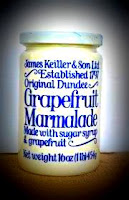Photo by Jennifer Pittam
Arguments abound on the internet and elsewhere about the origin of marmalade. There's little doubt that preserves containing peel were eaten, and mentioned, as early as Shakespeare's time. However, for me the definitive story is that, in 1700, a storm-tossed ship bearing a cargo of bitter Seville Oranges took shelter in Dundee harbour, off the coast of Scotland.
The ship's master sold the now damaged cargo to a local grocer, who was down on his luck and hopeful of saving the family fortune. Once he got the organges home, how many tons is not recorded, he and his wife discovered that they were too bitter to eat (wonder what she said to him? 'Wheesht, Mr Keiller,' probably).
Undaunted, she set about making jars and jars of preserves with the oranges, and thus the Keiller fortunes were not only restored, but remade a thousand fold.
Marmalade's still made today in Dundee, particularly by the Mackay family who use the traditional, copper-pan method. For modern tastes, it is not sweet enough, apparently - but for me, it's a marvellous start to the day on toast or Scottish oatcakes. Just like Paddington bear, I've got to have some with me wherever I travel.
Marmalade used to be notoriously good for treating sea sickness, before the days of modern drugs. My Nana told me that this is the origin of the name, as in Mer Malade, particularly as the journey to France from Scotland, beating down the east coast in foul weather, was liable to produce plenty of mer malade.
This explanation seems lost in the mists of time, and if you Google 'marmalade' today, you'll get all kinds of explanations - that in Portugal they make a quince jam called 'marmelot', for example.
To me it seems tenuous, and who cares?
I'll stick with my Scottish Nan.
Come fill up my cup, come fill up my can
Come saddle my horses and call out my men
Unhook the West Port and let us gae free
For it's up with the bonnets o' Bonnie Dundee
Scottish Traditional
Jennifer Pittam has been published in: Aquarist & Pondkeeper, Astrology Monthly, Cosmopolitan, Ether Books, People's Friend, Prediction Magazine, Romany Routes, The Lady.
Competitions won: Coast to Coast Short Story Competition, 2nd Prize; Writers' Village Flash Fiction Competition, 1st Prize.
Competitions won: Coast to Coast Short Story Competition, 2nd Prize; Writers' Village Flash Fiction Competition, 1st Prize.







